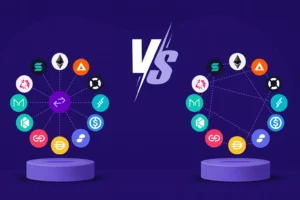
Yield Farming has gained traction as an attractive approach for investors in the rapidly expanding world of Decentralized Finance (DeFi) to increase their cryptocurrency returns. Yield farming on decentralized exchanges (DEX) has gained immense popularity due to its potential for high rewards and innovative approach to liquidity provision.
What is Yield Farming?
Yield farming, also known as liquidity mining, is a strategy where cryptocurrency holders provide their assets to liquidity pools on decentralized finance (DeFi) platforms to earn rewards.
Participants deposit their assets into these pools on Decentralized Exchanges (DEXs) or lending protocols, facilitating financial activities such as trading or lending. In return, they receive rewards that can include interest, transaction fees, or additional tokens. This approach is similar to earning interest on a traditional savings account, but with the potential for significantly higher returns due to the dynamic nature of the DeFi space.
The concept of yield farming emerged in the early days of DeFi, where it initially aimed to incentivize users to supply liquidity for trading on decentralized exchanges. As the DeFi ecosystem evolved, so did Yield Farming Platforms strategies. These strategies grew more sophisticated, incorporating various DeFi protocols and governance tokens. This evolution allowed for more complex and potentially profitable farming opportunities, contributing to the expansion and innovation within the DeFi sector.
Early adopters of yield farming experienced substantial gains, which accelerated the adoption and growth of this financial strategy. The rapid success and increased user engagement underscored the transformative impact of yield farming on how individuals interact with financial systems. By allowing users to earn returns on their digital assets while enhancing the functionality of decentralized platforms, yield farming has played a crucial role in the DeFi development and popularity of DeFi.
Types of Yield Farming Strategies
Yield Farming involves various strategies, each with distinct approaches and risk profiles. One common strategy is liquidity mining, where users provide liquidity to specific trading pairs on decentralized exchanges (DEXs) and earn rewards from transaction fees. For instance, by contributing liquidity to an ETH/USDT pool, users receive a portion of the fees generated from trades within that pool.
Another prevalent strategy is staking, where investors lock up their tokens in a staking protocol to earn rewards. This process often includes participating in the governance of the protocol, with rewards typically given in the form of additional tokens. Additionally, lending is a strategy where users lend their assets to lending protocols and earn interest from borrowers. This approach enables users to generate passive income by supplying liquidity to platforms that facilitate borrowing and lending transactions.
How Yield Farming Works on Decentralized Exchanges (DEX)
Yield farming on Decentralized Exchanges (DEXs) involves several key steps to maximize its effectiveness. The first step is choosing the right DEX, such as Uniswap, SushiSwap, PancakeSwap, or Curve Finance. Each platform has distinct features and incentives, so it’s essential to evaluate factors like supported assets, fee structures, and the platform’s reputation. For instance, Uniswap is known for its broad range of trading pairs, while PancakeSwap offers lower fees and faster transactions on the Binance Smart Chain. Platforms that leverage DEX Development Services often enhance their capabilities, ensuring a seamless user experience, optimized performance, and secure yield farming opportunities.
After selecting a DEX, users deposit their assets into liquidity pools, which are smart contracts that aggregate funds to facilitate trading. For example, depositing assets into an ETH/USDT liquidity pool helps provide liquidity for trades between ETH and USDT. In return, users receive liquidity Provider (LP) tokens, which represent their share of the pool. These tokens are crucial for claiming rewards and can also be staked in additional yield farming protocols for extra returns.
Rewards in yield farming primarily come from transaction fees within the liquidity pool, with a portion of these fees distributed to liquidity providers based on their contribution. Some DEXs also offer extra incentives like governance tokens. Regularly managing investments involves monitoring liquidity pool performance and LP token value, and considering factors such as impermanent loss when withdrawing funds. Impermanent loss occurs when the value of assets changes relative to their value at deposit, potentially impacting the value of LP tokens.
Benefits and Risks of Yield Farming
Yield farming presents both substantial benefits and notable risks. On the positive side, it can offer high returns compared to traditional investments, thanks to a mix of transaction fees and additional incentives. It also allows investors to diversify their assets across various liquidity pools and DeFi protocols, spreading risk and potentially increasing rewards. The decentralized nature of yield farming gives users more control over their assets and less dependence on traditional financial systems, while many platforms offer attractive incentives such as governance tokens and bonuses to enhance the experience.
However, yield farming is not without its risks. Impermanent loss can occur if the value of assets in a Yield Farming Pool changes relative to their initial deposit, potentially leading to financial losses. Additionally, Smart Contracts used in yield farming can have vulnerabilities or bugs, posing risks of financial loss or theft. Market volatility is another concern, as sudden price fluctuations can impact asset values and returns. Lastly, the credibility and security of the platforms are crucial; new or less-established platforms may carry higher risks of failure or security breaches. Balancing these benefits and risks is essential for making informed and strategic investment decisions.
Popular Platforms for Yield Farming on DEX
Several decentralized exchanges have become prominent for yield farming, each with unique features. Uniswap, a trailblazer in the space, operates with an automated market-making (AMM) protocol. Users can provide liquidity to various trading pairs and earn rewards from transaction fees and UNI tokens. Its extensive range of trading pairs, strong liquidity, and intuitive interface make Uniswap a preferred platform for those looking to maximize returns.
SushiSwap, a fork of Uniswap, offers additional features and a community-driven approach. Yield farming on SushiSwap involves earning rewards through its native SUSHI token, which also provides governance rights. The platform’s innovations in liquidity mining and staking, combined with its focus on community involvement, set it apart from other DEXs, providing a rich yield farming experience.
PancakeSwap, operating on the Binance Smart Chain (BSC), offers a cost-effective alternative with lower fees and faster transactions compared to Ethereum-based platforms. Users participate in liquidity pools and earn rewards in CAKE tokens. Its diverse liquidity pools and engaging features make PancakeSwap a popular choice for yield farming on BSC. Meanwhile, Curve Finance focuses on stablecoin liquidity pools, providing efficient trading with low slippage and predictable returns, while Yearn.finance aggregates yield farming strategies across multiple DeFi protocols to optimize returns through its automated vaults.
Why Choose Nadcab for Yield Farming Solutions?
For those seeking expert guidance and tailored solutions in yield farming, Nadcab stands out as a premier choice. With extensive experience in the DeFi space and a deep understanding of yield farming strategies, Nadcab offers customized solutions designed to optimize returns while effectively managing risks. Whether you are new to yield farming or looking to enhance your existing strategies, Nadcab provides the expertise, tools, and support necessary to navigate the complexities of decentralized finance and achieve your financial goals.
By choosing Nadcab Labs, you gain access to a team of experts dedicated to helping you maximize your yield farming opportunities. With our advanced strategies, personalized support, and commitment to innovation, Nadcab Labs ensures that you can confidently participate in the DeFi ecosystem and achieve the best possible outcomes from your yield farming investments.







